Business Society Report: CSR Analysis of CBA and Danske Bank
VerifiedAdded on 2020/10/22
|12
|2998
|76
Report
AI Summary
This report provides a comparative analysis of the Corporate Social Responsibility (CSR) activities of the Commonwealth Bank of Australia (CBA) and Danske Bank. The introduction outlines the report's focus on the financial services industry, specifically examining the CSR approaches of these two banks, their sustainable development goals (SDGs), and the quality of their social accounting. Part A delves into the comparison of CBA and Danske Bank, highlighting their similarities and differences in CSR practices, with specific emphasis on their SDG contributions, and their approach to social accounting. The report assesses the quality of their social accounting using established standards, evaluates their values and missions, and concludes with a discussion summarizing the key findings and implications of their CSR efforts. The report also examines the values, mission, and strategic approaches of both organizations, emphasizing their commitment to financial well-being, community support, and ethical business practices.
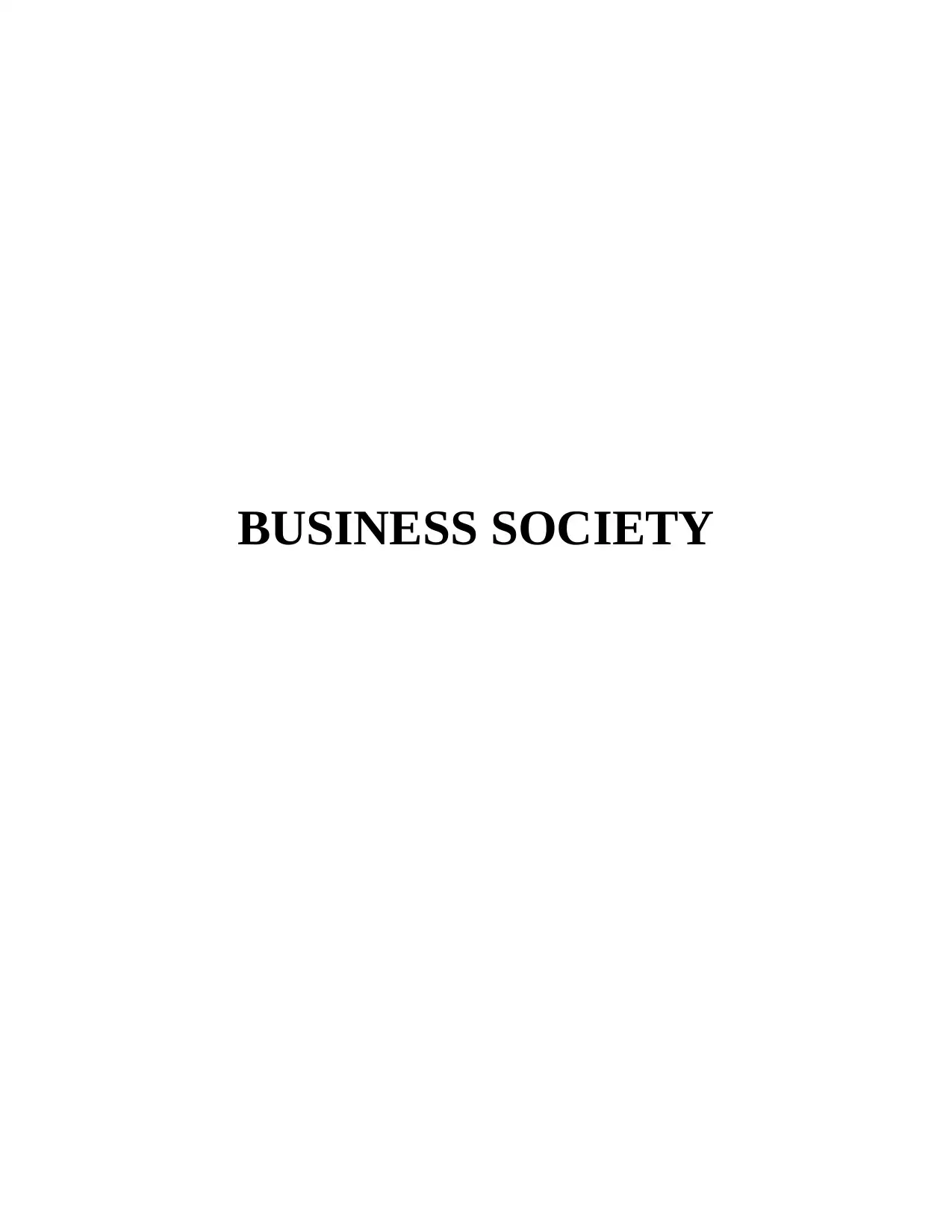
BUSINESS SOCIETY
Paraphrase This Document
Need a fresh take? Get an instant paraphrase of this document with our AI Paraphraser
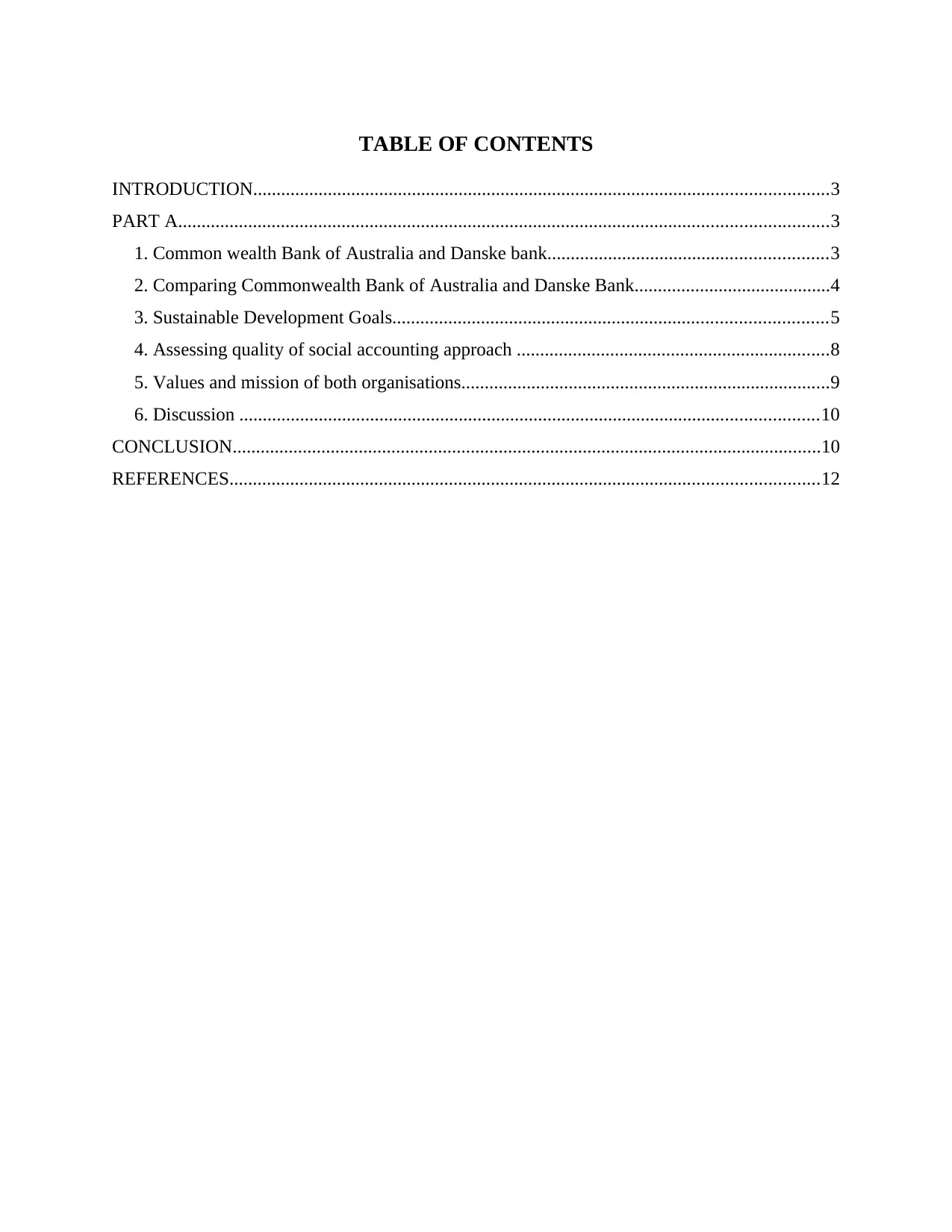
TABLE OF CONTENTS
INTRODUCTION...........................................................................................................................3
PART A...........................................................................................................................................3
1. Common wealth Bank of Australia and Danske bank............................................................3
2. Comparing Commonwealth Bank of Australia and Danske Bank..........................................4
3. Sustainable Development Goals.............................................................................................5
4. Assessing quality of social accounting approach ...................................................................8
5. Values and mission of both organisations...............................................................................9
6. Discussion ............................................................................................................................10
CONCLUSION..............................................................................................................................10
REFERENCES..............................................................................................................................12
INTRODUCTION...........................................................................................................................3
PART A...........................................................................................................................................3
1. Common wealth Bank of Australia and Danske bank............................................................3
2. Comparing Commonwealth Bank of Australia and Danske Bank..........................................4
3. Sustainable Development Goals.............................................................................................5
4. Assessing quality of social accounting approach ...................................................................8
5. Values and mission of both organisations...............................................................................9
6. Discussion ............................................................................................................................10
CONCLUSION..............................................................................................................................10
REFERENCES..............................................................................................................................12
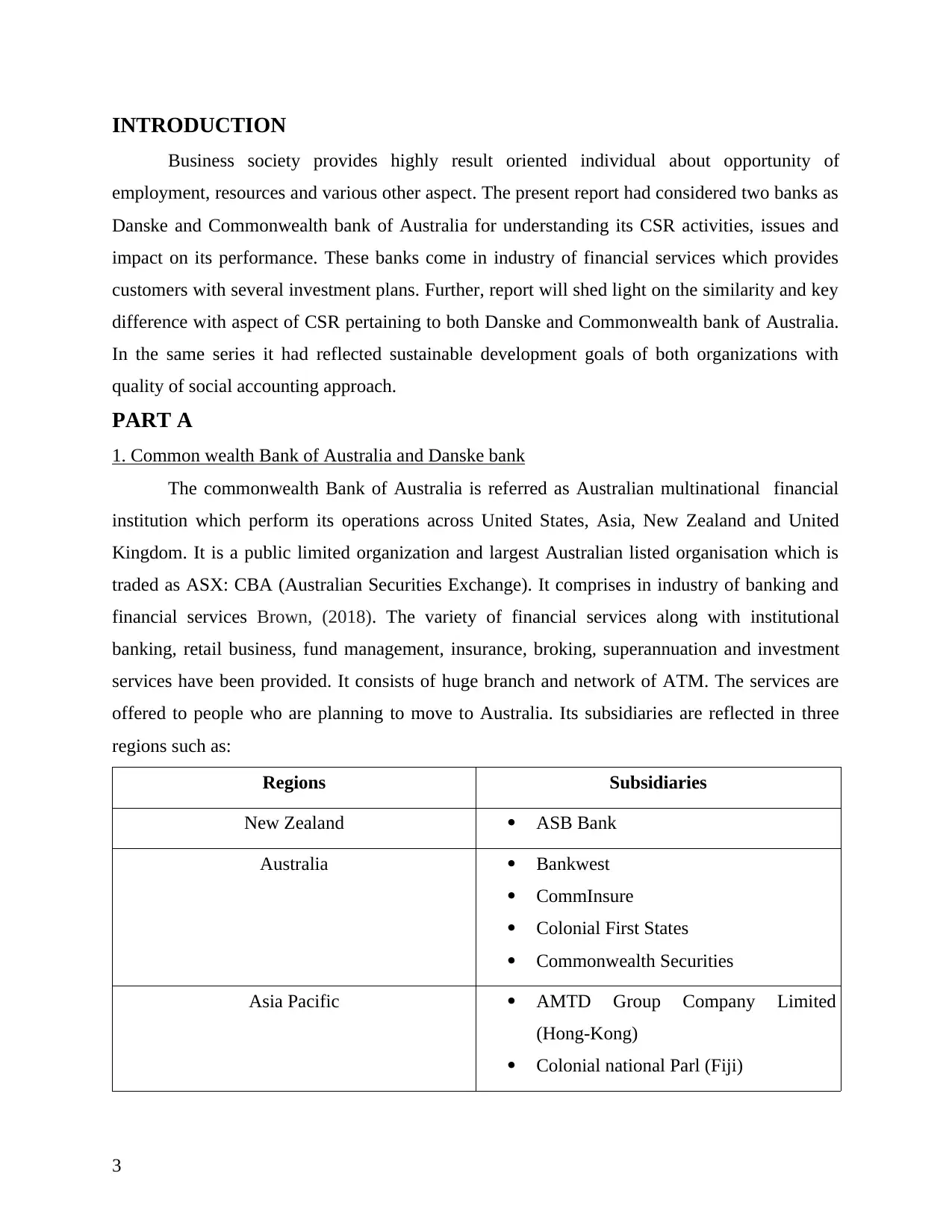
INTRODUCTION
Business society provides highly result oriented individual about opportunity of
employment, resources and various other aspect. The present report had considered two banks as
Danske and Commonwealth bank of Australia for understanding its CSR activities, issues and
impact on its performance. These banks come in industry of financial services which provides
customers with several investment plans. Further, report will shed light on the similarity and key
difference with aspect of CSR pertaining to both Danske and Commonwealth bank of Australia.
In the same series it had reflected sustainable development goals of both organizations with
quality of social accounting approach.
PART A
1. Common wealth Bank of Australia and Danske bank
The commonwealth Bank of Australia is referred as Australian multinational financial
institution which perform its operations across United States, Asia, New Zealand and United
Kingdom. It is a public limited organization and largest Australian listed organisation which is
traded as ASX: CBA (Australian Securities Exchange). It comprises in industry of banking and
financial services Brown, (2018). The variety of financial services along with institutional
banking, retail business, fund management, insurance, broking, superannuation and investment
services have been provided. It consists of huge branch and network of ATM. The services are
offered to people who are planning to move to Australia. Its subsidiaries are reflected in three
regions such as:
Regions Subsidiaries
New Zealand ASB Bank
Australia Bankwest
CommInsure
Colonial First States
Commonwealth Securities
Asia Pacific AMTD Group Company Limited
(Hong-Kong)
Colonial national Parl (Fiji)
3
Business society provides highly result oriented individual about opportunity of
employment, resources and various other aspect. The present report had considered two banks as
Danske and Commonwealth bank of Australia for understanding its CSR activities, issues and
impact on its performance. These banks come in industry of financial services which provides
customers with several investment plans. Further, report will shed light on the similarity and key
difference with aspect of CSR pertaining to both Danske and Commonwealth bank of Australia.
In the same series it had reflected sustainable development goals of both organizations with
quality of social accounting approach.
PART A
1. Common wealth Bank of Australia and Danske bank
The commonwealth Bank of Australia is referred as Australian multinational financial
institution which perform its operations across United States, Asia, New Zealand and United
Kingdom. It is a public limited organization and largest Australian listed organisation which is
traded as ASX: CBA (Australian Securities Exchange). It comprises in industry of banking and
financial services Brown, (2018). The variety of financial services along with institutional
banking, retail business, fund management, insurance, broking, superannuation and investment
services have been provided. It consists of huge branch and network of ATM. The services are
offered to people who are planning to move to Australia. Its subsidiaries are reflected in three
regions such as:
Regions Subsidiaries
New Zealand ASB Bank
Australia Bankwest
CommInsure
Colonial First States
Commonwealth Securities
Asia Pacific AMTD Group Company Limited
(Hong-Kong)
Colonial national Parl (Fiji)
3
⊘ This is a preview!⊘
Do you want full access?
Subscribe today to unlock all pages.

Trusted by 1+ million students worldwide
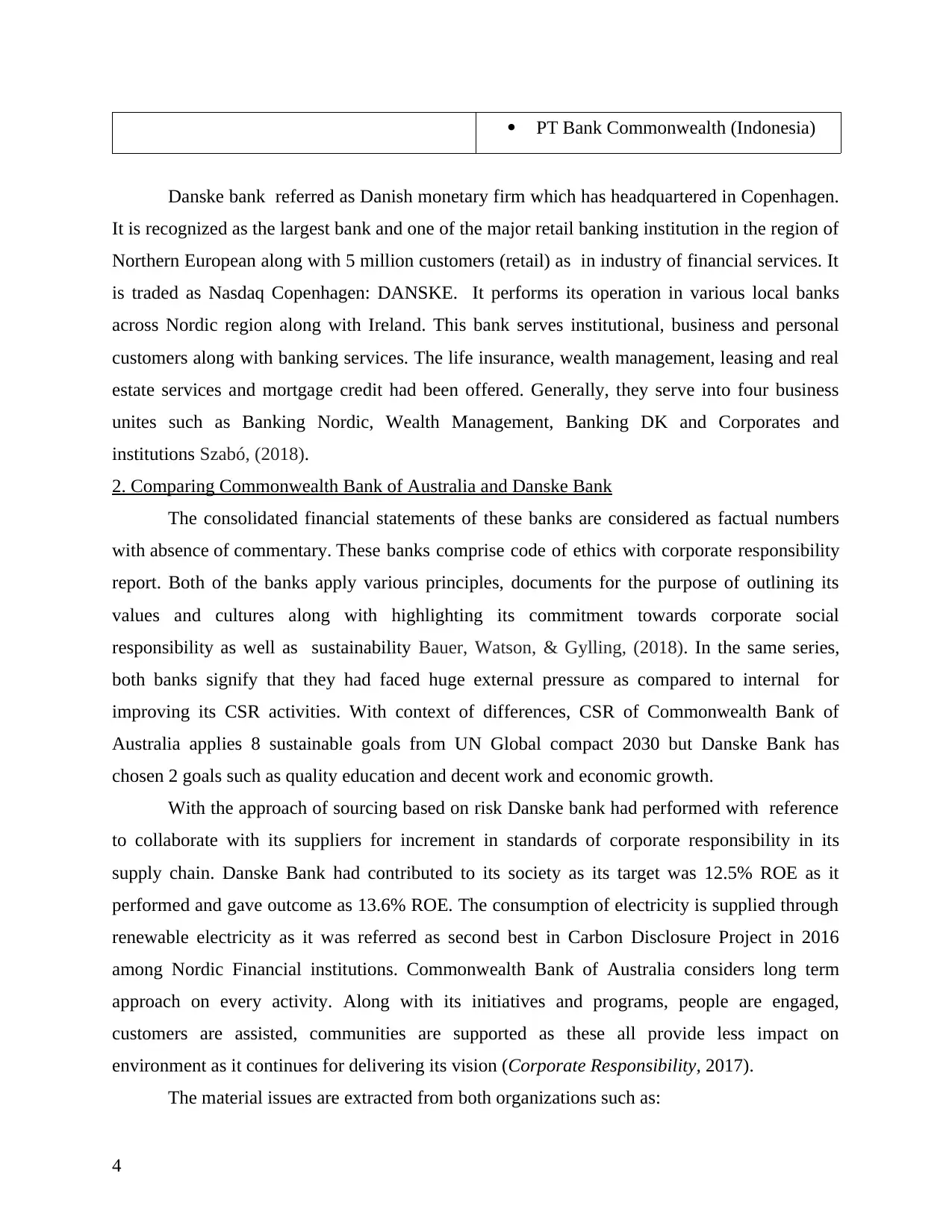
PT Bank Commonwealth (Indonesia)
Danske bank referred as Danish monetary firm which has headquartered in Copenhagen.
It is recognized as the largest bank and one of the major retail banking institution in the region of
Northern European along with 5 million customers (retail) as in industry of financial services. It
is traded as Nasdaq Copenhagen: DANSKE. It performs its operation in various local banks
across Nordic region along with Ireland. This bank serves institutional, business and personal
customers along with banking services. The life insurance, wealth management, leasing and real
estate services and mortgage credit had been offered. Generally, they serve into four business
unites such as Banking Nordic, Wealth Management, Banking DK and Corporates and
institutions Szabó, (2018).
2. Comparing Commonwealth Bank of Australia and Danske Bank
The consolidated financial statements of these banks are considered as factual numbers
with absence of commentary. These banks comprise code of ethics with corporate responsibility
report. Both of the banks apply various principles, documents for the purpose of outlining its
values and cultures along with highlighting its commitment towards corporate social
responsibility as well as sustainability Bauer, Watson, & Gylling, (2018). In the same series,
both banks signify that they had faced huge external pressure as compared to internal for
improving its CSR activities. With context of differences, CSR of Commonwealth Bank of
Australia applies 8 sustainable goals from UN Global compact 2030 but Danske Bank has
chosen 2 goals such as quality education and decent work and economic growth.
With the approach of sourcing based on risk Danske bank had performed with reference
to collaborate with its suppliers for increment in standards of corporate responsibility in its
supply chain. Danske Bank had contributed to its society as its target was 12.5% ROE as it
performed and gave outcome as 13.6% ROE. The consumption of electricity is supplied through
renewable electricity as it was referred as second best in Carbon Disclosure Project in 2016
among Nordic Financial institutions. Commonwealth Bank of Australia considers long term
approach on every activity. Along with its initiatives and programs, people are engaged,
customers are assisted, communities are supported as these all provide less impact on
environment as it continues for delivering its vision (Corporate Responsibility, 2017).
The material issues are extracted from both organizations such as:
4
Danske bank referred as Danish monetary firm which has headquartered in Copenhagen.
It is recognized as the largest bank and one of the major retail banking institution in the region of
Northern European along with 5 million customers (retail) as in industry of financial services. It
is traded as Nasdaq Copenhagen: DANSKE. It performs its operation in various local banks
across Nordic region along with Ireland. This bank serves institutional, business and personal
customers along with banking services. The life insurance, wealth management, leasing and real
estate services and mortgage credit had been offered. Generally, they serve into four business
unites such as Banking Nordic, Wealth Management, Banking DK and Corporates and
institutions Szabó, (2018).
2. Comparing Commonwealth Bank of Australia and Danske Bank
The consolidated financial statements of these banks are considered as factual numbers
with absence of commentary. These banks comprise code of ethics with corporate responsibility
report. Both of the banks apply various principles, documents for the purpose of outlining its
values and cultures along with highlighting its commitment towards corporate social
responsibility as well as sustainability Bauer, Watson, & Gylling, (2018). In the same series,
both banks signify that they had faced huge external pressure as compared to internal for
improving its CSR activities. With context of differences, CSR of Commonwealth Bank of
Australia applies 8 sustainable goals from UN Global compact 2030 but Danske Bank has
chosen 2 goals such as quality education and decent work and economic growth.
With the approach of sourcing based on risk Danske bank had performed with reference
to collaborate with its suppliers for increment in standards of corporate responsibility in its
supply chain. Danske Bank had contributed to its society as its target was 12.5% ROE as it
performed and gave outcome as 13.6% ROE. The consumption of electricity is supplied through
renewable electricity as it was referred as second best in Carbon Disclosure Project in 2016
among Nordic Financial institutions. Commonwealth Bank of Australia considers long term
approach on every activity. Along with its initiatives and programs, people are engaged,
customers are assisted, communities are supported as these all provide less impact on
environment as it continues for delivering its vision (Corporate Responsibility, 2017).
The material issues are extracted from both organizations such as:
4
Paraphrase This Document
Need a fresh take? Get an instant paraphrase of this document with our AI Paraphraser
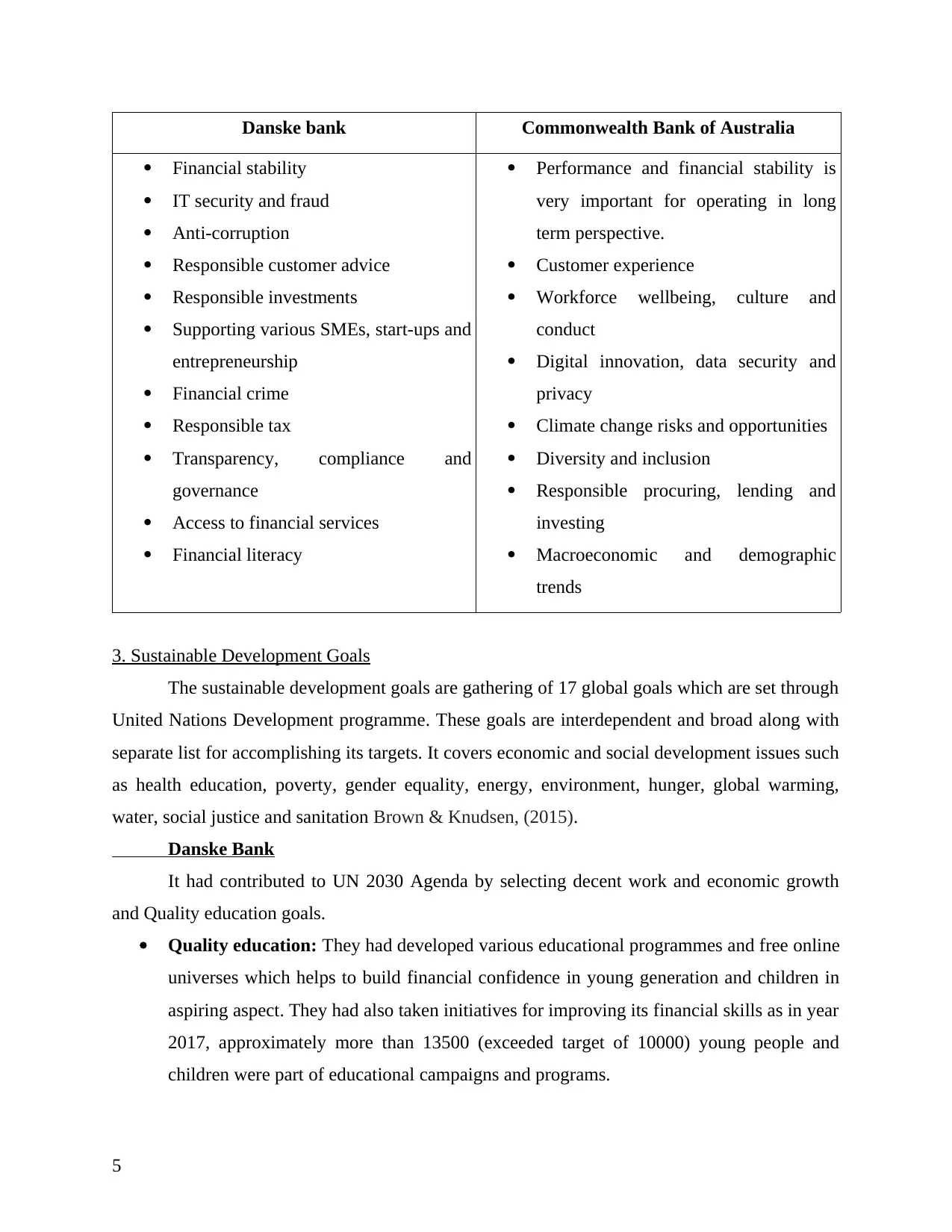
Danske bank Commonwealth Bank of Australia
Financial stability
IT security and fraud
Anti-corruption
Responsible customer advice
Responsible investments
Supporting various SMEs, start-ups and
entrepreneurship
Financial crime
Responsible tax
Transparency, compliance and
governance
Access to financial services
Financial literacy
Performance and financial stability is
very important for operating in long
term perspective.
Customer experience
Workforce wellbeing, culture and
conduct
Digital innovation, data security and
privacy
Climate change risks and opportunities
Diversity and inclusion
Responsible procuring, lending and
investing
Macroeconomic and demographic
trends
3. Sustainable Development Goals
The sustainable development goals are gathering of 17 global goals which are set through
United Nations Development programme. These goals are interdependent and broad along with
separate list for accomplishing its targets. It covers economic and social development issues such
as health education, poverty, gender equality, energy, environment, hunger, global warming,
water, social justice and sanitation Brown & Knudsen, (2015).
Danske Bank
It had contributed to UN 2030 Agenda by selecting decent work and economic growth
and Quality education goals.
Quality education: They had developed various educational programmes and free online
universes which helps to build financial confidence in young generation and children in
aspiring aspect. They had also taken initiatives for improving its financial skills as in year
2017, approximately more than 13500 (exceeded target of 10000) young people and
children were part of educational campaigns and programs.
5
Financial stability
IT security and fraud
Anti-corruption
Responsible customer advice
Responsible investments
Supporting various SMEs, start-ups and
entrepreneurship
Financial crime
Responsible tax
Transparency, compliance and
governance
Access to financial services
Financial literacy
Performance and financial stability is
very important for operating in long
term perspective.
Customer experience
Workforce wellbeing, culture and
conduct
Digital innovation, data security and
privacy
Climate change risks and opportunities
Diversity and inclusion
Responsible procuring, lending and
investing
Macroeconomic and demographic
trends
3. Sustainable Development Goals
The sustainable development goals are gathering of 17 global goals which are set through
United Nations Development programme. These goals are interdependent and broad along with
separate list for accomplishing its targets. It covers economic and social development issues such
as health education, poverty, gender equality, energy, environment, hunger, global warming,
water, social justice and sanitation Brown & Knudsen, (2015).
Danske Bank
It had contributed to UN 2030 Agenda by selecting decent work and economic growth
and Quality education goals.
Quality education: They had developed various educational programmes and free online
universes which helps to build financial confidence in young generation and children in
aspiring aspect. They had also taken initiatives for improving its financial skills as in year
2017, approximately more than 13500 (exceeded target of 10000) young people and
children were part of educational campaigns and programs.
5
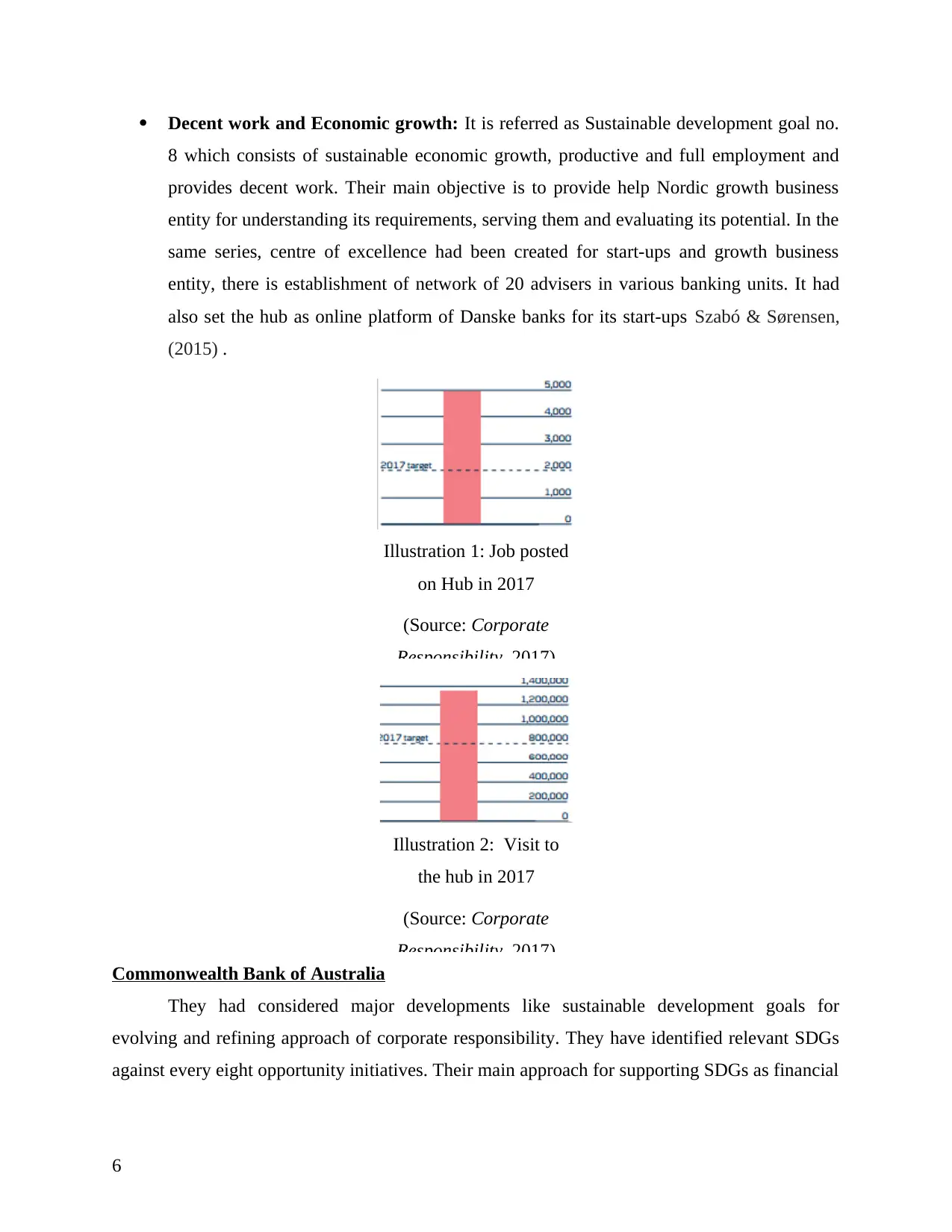
Decent work and Economic growth: It is referred as Sustainable development goal no.
8 which consists of sustainable economic growth, productive and full employment and
provides decent work. Their main objective is to provide help Nordic growth business
entity for understanding its requirements, serving them and evaluating its potential. In the
same series, centre of excellence had been created for start-ups and growth business
entity, there is establishment of network of 20 advisers in various banking units. It had
also set the hub as online platform of Danske banks for its start-ups Szabó & Sørensen,
(2015) .
Illustration 1: Job posted
on Hub in 2017
(Source: Corporate
Responsibility, 2017)
Illustration 2: Visit to
the hub in 2017
(Source: Corporate
Responsibility, 2017)
Commonwealth Bank of Australia
They had considered major developments like sustainable development goals for
evolving and refining approach of corporate responsibility. They have identified relevant SDGs
against every eight opportunity initiatives. Their main approach for supporting SDGs as financial
6
8 which consists of sustainable economic growth, productive and full employment and
provides decent work. Their main objective is to provide help Nordic growth business
entity for understanding its requirements, serving them and evaluating its potential. In the
same series, centre of excellence had been created for start-ups and growth business
entity, there is establishment of network of 20 advisers in various banking units. It had
also set the hub as online platform of Danske banks for its start-ups Szabó & Sørensen,
(2015) .
Illustration 1: Job posted
on Hub in 2017
(Source: Corporate
Responsibility, 2017)
Illustration 2: Visit to
the hub in 2017
(Source: Corporate
Responsibility, 2017)
Commonwealth Bank of Australia
They had considered major developments like sustainable development goals for
evolving and refining approach of corporate responsibility. They have identified relevant SDGs
against every eight opportunity initiatives. Their main approach for supporting SDGs as financial
6
⊘ This is a preview!⊘
Do you want full access?
Subscribe today to unlock all pages.

Trusted by 1+ million students worldwide
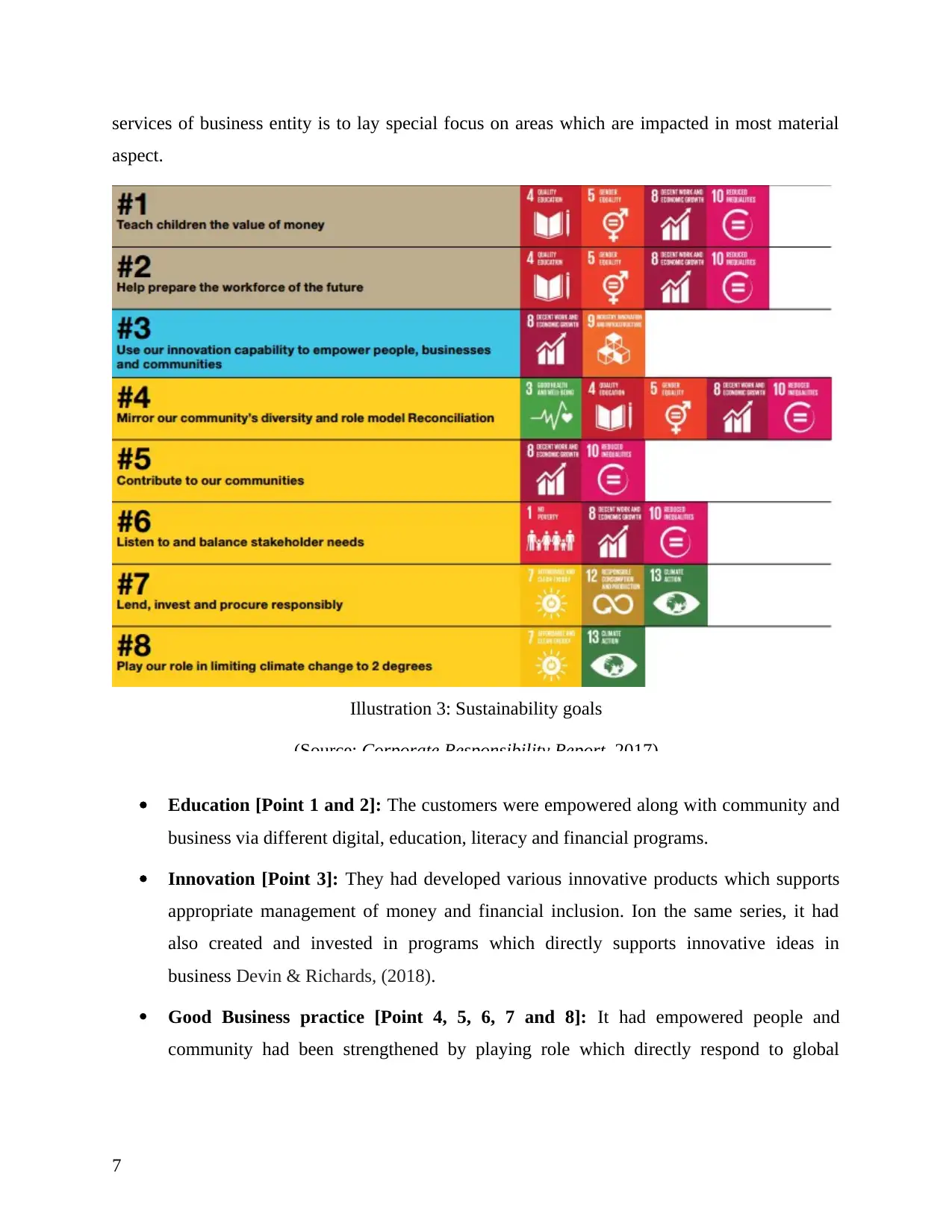
services of business entity is to lay special focus on areas which are impacted in most material
aspect.
Illustration 3: Sustainability goals
(Source: Corporate Responsibility Report, 2017)
Education [Point 1 and 2]: The customers were empowered along with community and
business via different digital, education, literacy and financial programs.
Innovation [Point 3]: They had developed various innovative products which supports
appropriate management of money and financial inclusion. Ion the same series, it had
also created and invested in programs which directly supports innovative ideas in
business Devin & Richards, (2018).
Good Business practice [Point 4, 5, 6, 7 and 8]: It had empowered people and
community had been strengthened by playing role which directly respond to global
7
aspect.
Illustration 3: Sustainability goals
(Source: Corporate Responsibility Report, 2017)
Education [Point 1 and 2]: The customers were empowered along with community and
business via different digital, education, literacy and financial programs.
Innovation [Point 3]: They had developed various innovative products which supports
appropriate management of money and financial inclusion. Ion the same series, it had
also created and invested in programs which directly supports innovative ideas in
business Devin & Richards, (2018).
Good Business practice [Point 4, 5, 6, 7 and 8]: It had empowered people and
community had been strengthened by playing role which directly respond to global
7
Paraphrase This Document
Need a fresh take? Get an instant paraphrase of this document with our AI Paraphraser
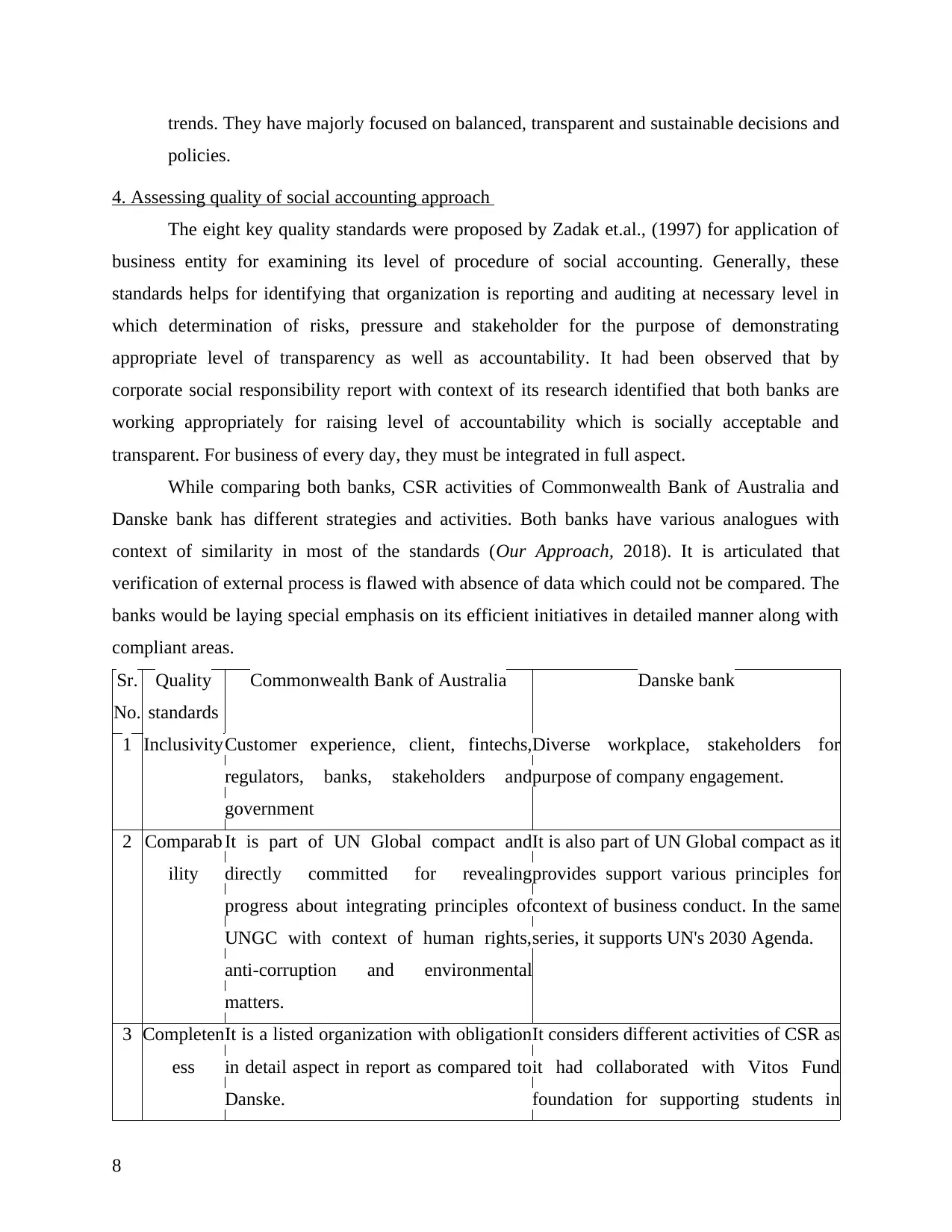
trends. They have majorly focused on balanced, transparent and sustainable decisions and
policies.
4. Assessing quality of social accounting approach
The eight key quality standards were proposed by Zadak et.al., (1997) for application of
business entity for examining its level of procedure of social accounting. Generally, these
standards helps for identifying that organization is reporting and auditing at necessary level in
which determination of risks, pressure and stakeholder for the purpose of demonstrating
appropriate level of transparency as well as accountability. It had been observed that by
corporate social responsibility report with context of its research identified that both banks are
working appropriately for raising level of accountability which is socially acceptable and
transparent. For business of every day, they must be integrated in full aspect.
While comparing both banks, CSR activities of Commonwealth Bank of Australia and
Danske bank has different strategies and activities. Both banks have various analogues with
context of similarity in most of the standards (Our Approach, 2018). It is articulated that
verification of external process is flawed with absence of data which could not be compared. The
banks would be laying special emphasis on its efficient initiatives in detailed manner along with
compliant areas.
Sr.
No.
Quality
standards
Commonwealth Bank of Australia Danske bank
1 InclusivityCustomer experience, client, fintechs,
regulators, banks, stakeholders and
government
Diverse workplace, stakeholders for
purpose of company engagement.
2 Comparab
ility
It is part of UN Global compact and
directly committed for revealing
progress about integrating principles of
UNGC with context of human rights,
anti-corruption and environmental
matters.
It is also part of UN Global compact as it
provides support various principles for
context of business conduct. In the same
series, it supports UN's 2030 Agenda.
3 Completen
ess
It is a listed organization with obligation
in detail aspect in report as compared to
Danske.
It considers different activities of CSR as
it had collaborated with Vitos Fund
foundation for supporting students in
8
policies.
4. Assessing quality of social accounting approach
The eight key quality standards were proposed by Zadak et.al., (1997) for application of
business entity for examining its level of procedure of social accounting. Generally, these
standards helps for identifying that organization is reporting and auditing at necessary level in
which determination of risks, pressure and stakeholder for the purpose of demonstrating
appropriate level of transparency as well as accountability. It had been observed that by
corporate social responsibility report with context of its research identified that both banks are
working appropriately for raising level of accountability which is socially acceptable and
transparent. For business of every day, they must be integrated in full aspect.
While comparing both banks, CSR activities of Commonwealth Bank of Australia and
Danske bank has different strategies and activities. Both banks have various analogues with
context of similarity in most of the standards (Our Approach, 2018). It is articulated that
verification of external process is flawed with absence of data which could not be compared. The
banks would be laying special emphasis on its efficient initiatives in detailed manner along with
compliant areas.
Sr.
No.
Quality
standards
Commonwealth Bank of Australia Danske bank
1 InclusivityCustomer experience, client, fintechs,
regulators, banks, stakeholders and
government
Diverse workplace, stakeholders for
purpose of company engagement.
2 Comparab
ility
It is part of UN Global compact and
directly committed for revealing
progress about integrating principles of
UNGC with context of human rights,
anti-corruption and environmental
matters.
It is also part of UN Global compact as it
provides support various principles for
context of business conduct. In the same
series, it supports UN's 2030 Agenda.
3 Completen
ess
It is a listed organization with obligation
in detail aspect in report as compared to
Danske.
It considers different activities of CSR as
it had collaborated with Vitos Fund
foundation for supporting students in
8
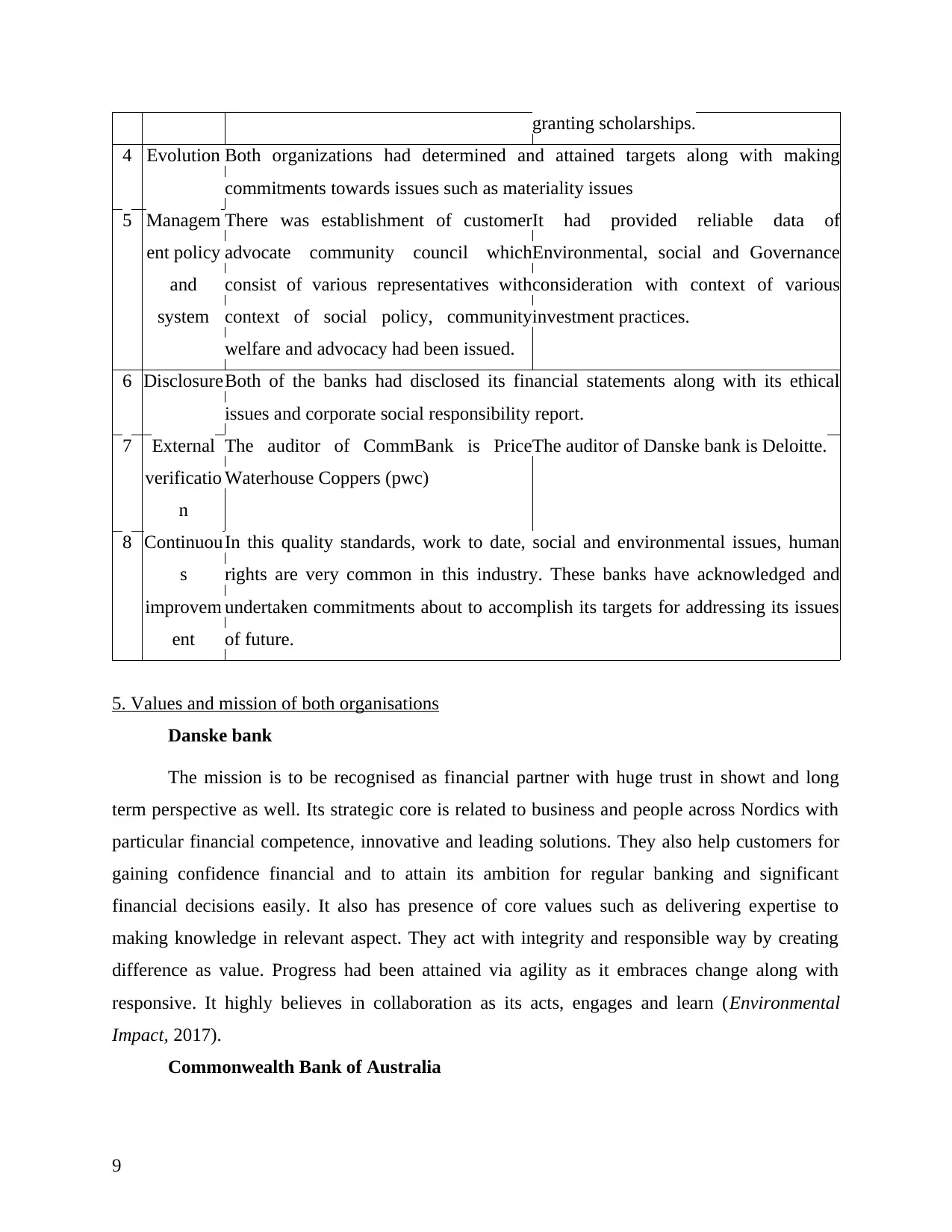
granting scholarships.
4 Evolution Both organizations had determined and attained targets along with making
commitments towards issues such as materiality issues
5 Managem
ent policy
and
system
There was establishment of customer
advocate community council which
consist of various representatives with
context of social policy, community
welfare and advocacy had been issued.
It had provided reliable data of
Environmental, social and Governance
consideration with context of various
investment practices.
6 DisclosureBoth of the banks had disclosed its financial statements along with its ethical
issues and corporate social responsibility report.
7 External
verificatio
n
The auditor of CommBank is Price
Waterhouse Coppers (pwc)
The auditor of Danske bank is Deloitte.
8 Continuou
s
improvem
ent
In this quality standards, work to date, social and environmental issues, human
rights are very common in this industry. These banks have acknowledged and
undertaken commitments about to accomplish its targets for addressing its issues
of future.
5. Values and mission of both organisations
Danske bank
The mission is to be recognised as financial partner with huge trust in showt and long
term perspective as well. Its strategic core is related to business and people across Nordics with
particular financial competence, innovative and leading solutions. They also help customers for
gaining confidence financial and to attain its ambition for regular banking and significant
financial decisions easily. It also has presence of core values such as delivering expertise to
making knowledge in relevant aspect. They act with integrity and responsible way by creating
difference as value. Progress had been attained via agility as it embraces change along with
responsive. It highly believes in collaboration as its acts, engages and learn (Environmental
Impact, 2017).
Commonwealth Bank of Australia
9
4 Evolution Both organizations had determined and attained targets along with making
commitments towards issues such as materiality issues
5 Managem
ent policy
and
system
There was establishment of customer
advocate community council which
consist of various representatives with
context of social policy, community
welfare and advocacy had been issued.
It had provided reliable data of
Environmental, social and Governance
consideration with context of various
investment practices.
6 DisclosureBoth of the banks had disclosed its financial statements along with its ethical
issues and corporate social responsibility report.
7 External
verificatio
n
The auditor of CommBank is Price
Waterhouse Coppers (pwc)
The auditor of Danske bank is Deloitte.
8 Continuou
s
improvem
ent
In this quality standards, work to date, social and environmental issues, human
rights are very common in this industry. These banks have acknowledged and
undertaken commitments about to accomplish its targets for addressing its issues
of future.
5. Values and mission of both organisations
Danske bank
The mission is to be recognised as financial partner with huge trust in showt and long
term perspective as well. Its strategic core is related to business and people across Nordics with
particular financial competence, innovative and leading solutions. They also help customers for
gaining confidence financial and to attain its ambition for regular banking and significant
financial decisions easily. It also has presence of core values such as delivering expertise to
making knowledge in relevant aspect. They act with integrity and responsible way by creating
difference as value. Progress had been attained via agility as it embraces change along with
responsive. It highly believes in collaboration as its acts, engages and learn (Environmental
Impact, 2017).
Commonwealth Bank of Australia
9
⊘ This is a preview!⊘
Do you want full access?
Subscribe today to unlock all pages.

Trusted by 1+ million students worldwide
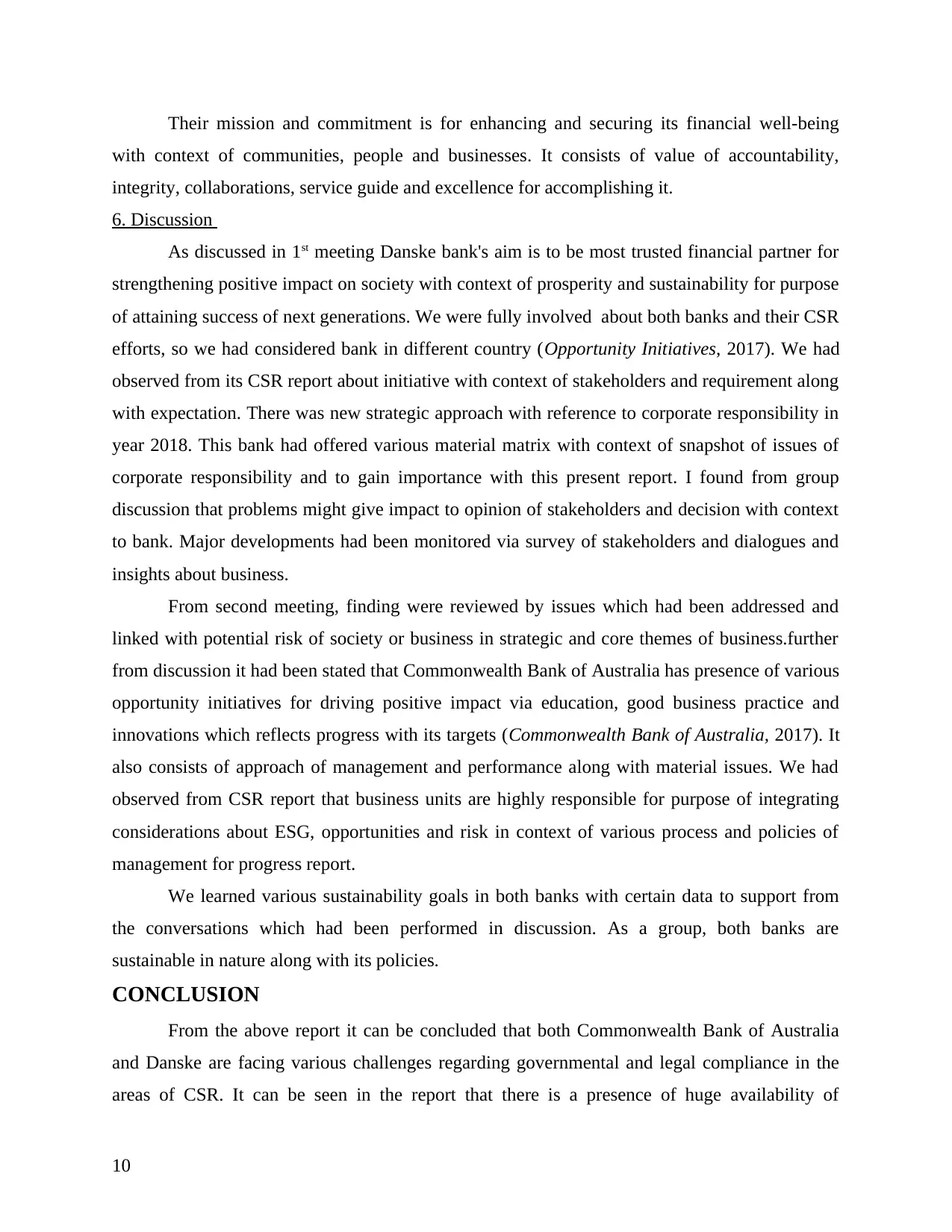
Their mission and commitment is for enhancing and securing its financial well-being
with context of communities, people and businesses. It consists of value of accountability,
integrity, collaborations, service guide and excellence for accomplishing it.
6. Discussion
As discussed in 1st meeting Danske bank's aim is to be most trusted financial partner for
strengthening positive impact on society with context of prosperity and sustainability for purpose
of attaining success of next generations. We were fully involved about both banks and their CSR
efforts, so we had considered bank in different country (Opportunity Initiatives, 2017). We had
observed from its CSR report about initiative with context of stakeholders and requirement along
with expectation. There was new strategic approach with reference to corporate responsibility in
year 2018. This bank had offered various material matrix with context of snapshot of issues of
corporate responsibility and to gain importance with this present report. I found from group
discussion that problems might give impact to opinion of stakeholders and decision with context
to bank. Major developments had been monitored via survey of stakeholders and dialogues and
insights about business.
From second meeting, finding were reviewed by issues which had been addressed and
linked with potential risk of society or business in strategic and core themes of business.further
from discussion it had been stated that Commonwealth Bank of Australia has presence of various
opportunity initiatives for driving positive impact via education, good business practice and
innovations which reflects progress with its targets (Commonwealth Bank of Australia, 2017). It
also consists of approach of management and performance along with material issues. We had
observed from CSR report that business units are highly responsible for purpose of integrating
considerations about ESG, opportunities and risk in context of various process and policies of
management for progress report.
We learned various sustainability goals in both banks with certain data to support from
the conversations which had been performed in discussion. As a group, both banks are
sustainable in nature along with its policies.
CONCLUSION
From the above report it can be concluded that both Commonwealth Bank of Australia
and Danske are facing various challenges regarding governmental and legal compliance in the
areas of CSR. It can be seen in the report that there is a presence of huge availability of
10
with context of communities, people and businesses. It consists of value of accountability,
integrity, collaborations, service guide and excellence for accomplishing it.
6. Discussion
As discussed in 1st meeting Danske bank's aim is to be most trusted financial partner for
strengthening positive impact on society with context of prosperity and sustainability for purpose
of attaining success of next generations. We were fully involved about both banks and their CSR
efforts, so we had considered bank in different country (Opportunity Initiatives, 2017). We had
observed from its CSR report about initiative with context of stakeholders and requirement along
with expectation. There was new strategic approach with reference to corporate responsibility in
year 2018. This bank had offered various material matrix with context of snapshot of issues of
corporate responsibility and to gain importance with this present report. I found from group
discussion that problems might give impact to opinion of stakeholders and decision with context
to bank. Major developments had been monitored via survey of stakeholders and dialogues and
insights about business.
From second meeting, finding were reviewed by issues which had been addressed and
linked with potential risk of society or business in strategic and core themes of business.further
from discussion it had been stated that Commonwealth Bank of Australia has presence of various
opportunity initiatives for driving positive impact via education, good business practice and
innovations which reflects progress with its targets (Commonwealth Bank of Australia, 2017). It
also consists of approach of management and performance along with material issues. We had
observed from CSR report that business units are highly responsible for purpose of integrating
considerations about ESG, opportunities and risk in context of various process and policies of
management for progress report.
We learned various sustainability goals in both banks with certain data to support from
the conversations which had been performed in discussion. As a group, both banks are
sustainable in nature along with its policies.
CONCLUSION
From the above report it can be concluded that both Commonwealth Bank of Australia
and Danske are facing various challenges regarding governmental and legal compliance in the
areas of CSR. It can be seen in the report that there is a presence of huge availability of
10
Paraphrase This Document
Need a fresh take? Get an instant paraphrase of this document with our AI Paraphraser
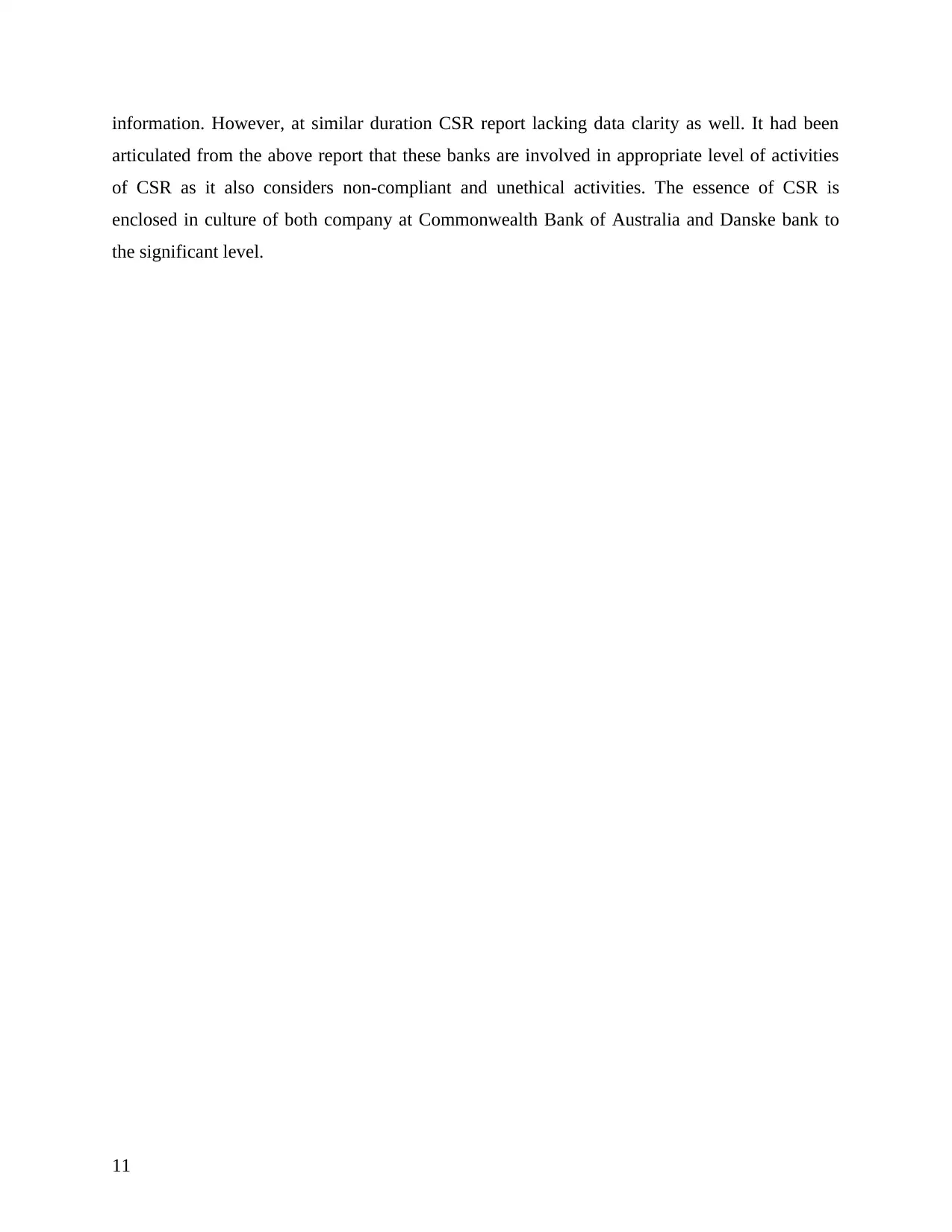
information. However, at similar duration CSR report lacking data clarity as well. It had been
articulated from the above report that these banks are involved in appropriate level of activities
of CSR as it also considers non-compliant and unethical activities. The essence of CSR is
enclosed in culture of both company at Commonwealth Bank of Australia and Danske bank to
the significant level.
11
articulated from the above report that these banks are involved in appropriate level of activities
of CSR as it also considers non-compliant and unethical activities. The essence of CSR is
enclosed in culture of both company at Commonwealth Bank of Australia and Danske bank to
the significant level.
11
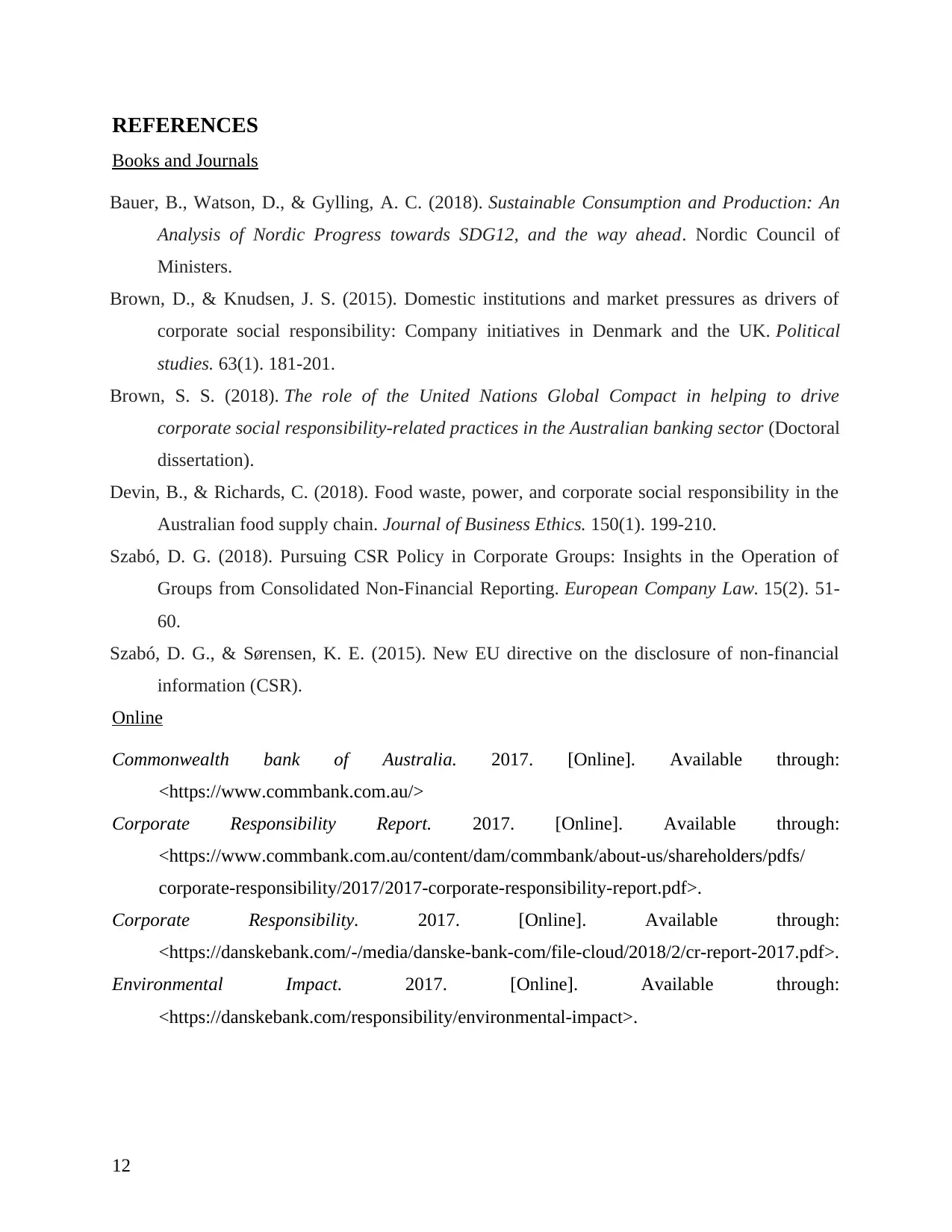
REFERENCES
Books and Journals
Bauer, B., Watson, D., & Gylling, A. C. (2018). Sustainable Consumption and Production: An
Analysis of Nordic Progress towards SDG12, and the way ahead. Nordic Council of
Ministers.
Brown, D., & Knudsen, J. S. (2015). Domestic institutions and market pressures as drivers of
corporate social responsibility: Company initiatives in Denmark and the UK. Political
studies. 63(1). 181-201.
Brown, S. S. (2018). The role of the United Nations Global Compact in helping to drive
corporate social responsibility-related practices in the Australian banking sector (Doctoral
dissertation).
Devin, B., & Richards, C. (2018). Food waste, power, and corporate social responsibility in the
Australian food supply chain. Journal of Business Ethics. 150(1). 199-210.
Szabó, D. G. (2018). Pursuing CSR Policy in Corporate Groups: Insights in the Operation of
Groups from Consolidated Non-Financial Reporting. European Company Law. 15(2). 51-
60.
Szabó, D. G., & Sørensen, K. E. (2015). New EU directive on the disclosure of non-financial
information (CSR).
Online
Commonwealth bank of Australia. 2017. [Online]. Available through:
<https://www.commbank.com.au/>
Corporate Responsibility Report. 2017. [Online]. Available through:
<https://www.commbank.com.au/content/dam/commbank/about-us/shareholders/pdfs/
corporate-responsibility/2017/2017-corporate-responsibility-report.pdf>.
Corporate Responsibility. 2017. [Online]. Available through:
<https://danskebank.com/-/media/danske-bank-com/file-cloud/2018/2/cr-report-2017.pdf>.
Environmental Impact. 2017. [Online]. Available through:
<https://danskebank.com/responsibility/environmental-impact>.
12
Books and Journals
Bauer, B., Watson, D., & Gylling, A. C. (2018). Sustainable Consumption and Production: An
Analysis of Nordic Progress towards SDG12, and the way ahead. Nordic Council of
Ministers.
Brown, D., & Knudsen, J. S. (2015). Domestic institutions and market pressures as drivers of
corporate social responsibility: Company initiatives in Denmark and the UK. Political
studies. 63(1). 181-201.
Brown, S. S. (2018). The role of the United Nations Global Compact in helping to drive
corporate social responsibility-related practices in the Australian banking sector (Doctoral
dissertation).
Devin, B., & Richards, C. (2018). Food waste, power, and corporate social responsibility in the
Australian food supply chain. Journal of Business Ethics. 150(1). 199-210.
Szabó, D. G. (2018). Pursuing CSR Policy in Corporate Groups: Insights in the Operation of
Groups from Consolidated Non-Financial Reporting. European Company Law. 15(2). 51-
60.
Szabó, D. G., & Sørensen, K. E. (2015). New EU directive on the disclosure of non-financial
information (CSR).
Online
Commonwealth bank of Australia. 2017. [Online]. Available through:
<https://www.commbank.com.au/>
Corporate Responsibility Report. 2017. [Online]. Available through:
<https://www.commbank.com.au/content/dam/commbank/about-us/shareholders/pdfs/
corporate-responsibility/2017/2017-corporate-responsibility-report.pdf>.
Corporate Responsibility. 2017. [Online]. Available through:
<https://danskebank.com/-/media/danske-bank-com/file-cloud/2018/2/cr-report-2017.pdf>.
Environmental Impact. 2017. [Online]. Available through:
<https://danskebank.com/responsibility/environmental-impact>.
12
⊘ This is a preview!⊘
Do you want full access?
Subscribe today to unlock all pages.

Trusted by 1+ million students worldwide
1 out of 12
Related Documents
Your All-in-One AI-Powered Toolkit for Academic Success.
+13062052269
info@desklib.com
Available 24*7 on WhatsApp / Email
![[object Object]](/_next/static/media/star-bottom.7253800d.svg)
Unlock your academic potential
Copyright © 2020–2026 A2Z Services. All Rights Reserved. Developed and managed by ZUCOL.





